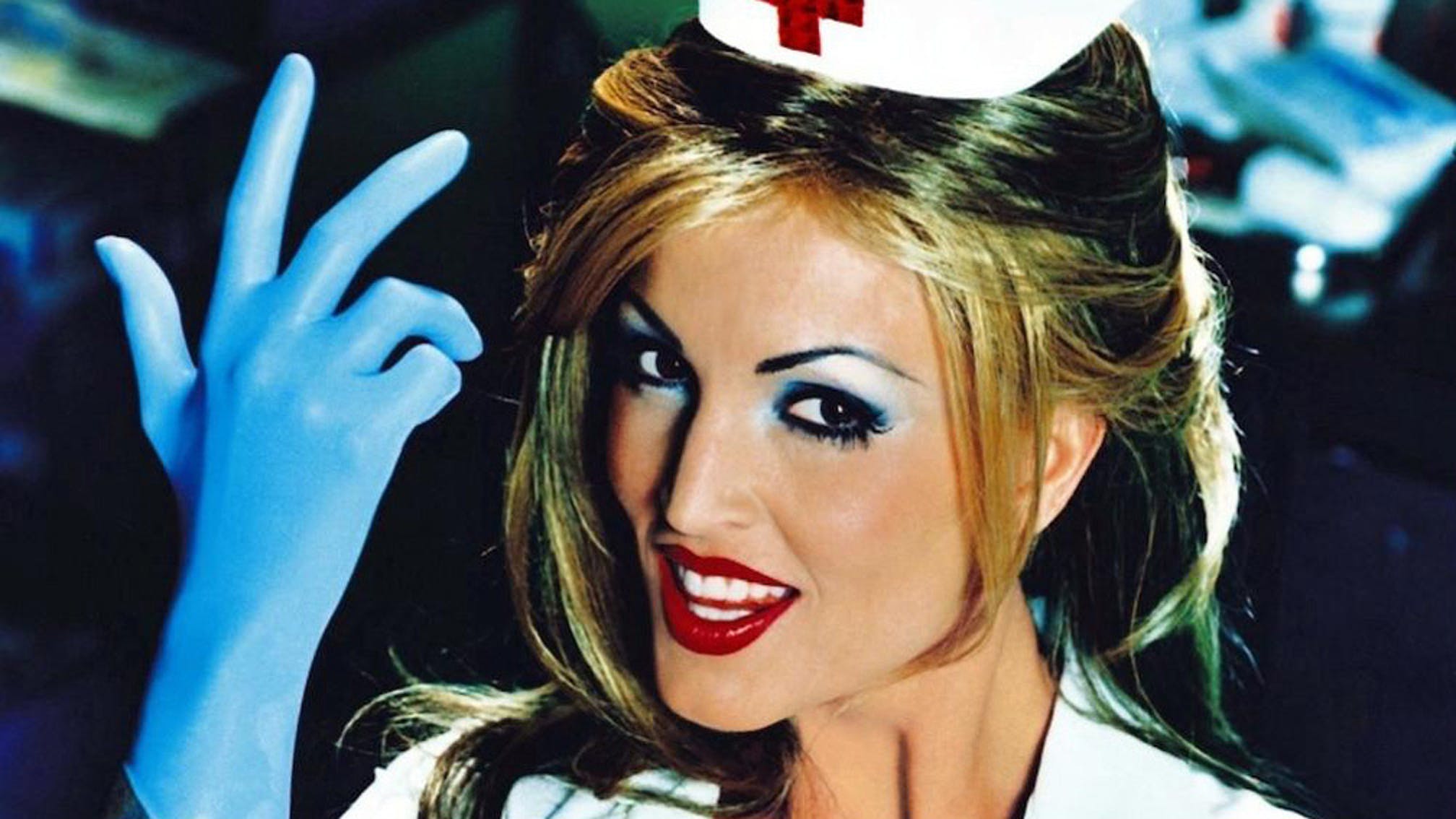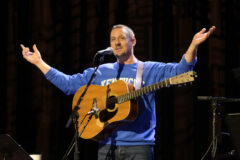Blink-182’s ‘Enema of the State’ turns 20 tomorrow. In honor of the anniversary, we’ve digitized and republished this story, which was originally published in the November 1999 issue of Spin.
It’s muggy mid-July in Philadelphia, and the Warped Tour has pitched its board-sports caravan on the grounds behind the First Union Spectrum. Outside the arena, a steady stream of boys bang ahead toward will-call, while their dates trail behind, hastily changing into the punk garb they’ve cleverly conceited beneath their Old Navy carpool clothes. Warped fancies itself a mainstream primer in punk rock for these young attendees—their initial foray into a genuine mosh pit, and first exposure to the rebellious anthems of wallet-chain lifers Social Distortion and Pennywise. But this year, Southern California trio Blink-182 are, by far, Warped’s most popular teachers.
In Philly, Blink opens class with a 30-second tone poem constructed entirely of expletives. A couple more numbers down the set list, guitarist/singer Tom Delonge yells out—winningly?—”Show us your tits!” Plenty of teen girls oblige. Bassist Mark Hoppus leans into the mic and introduces a midtempo ballad like this: “We’re going to play a slow one now, because I want more blowjobs.” Then it’s on to a cover of “Uncle Fucker” from the South Park movie. Blink’s leering, puerile patter would’ve been pretty common fare at a Mötley Crüe show 15 years back, but punks aren’t supposed to say “Show us your tits!” and get such a warm response.
Regardless, this Porky’s-caliber approach is paying off well for the hard-touring Blink boys. The band’s first Billboard-charting single, the pithy “Dammit (Growing Up),” examined pubescent jitters in a sardonic every-teen whine, but it was just a tiny dirt clod thrown in the wake of the Green Day-Offspring pop-punk groundswell. Their third album, Enema of the State, has made them full-fledged stars. Its leadoff single, “What’s My Age Again?,” another paean to the Peter Pan syndrome, is an ideal tonic for back-to-school nausea. The boys-will-be-boys video clip shows the band as they run naked through the streets of San Diego, only stopping for porno starlet Janine (who also graces Enema’s sleeve, in bondage nurse get-up). Blink’s Backstreet good looks have made them naturals for all-important media tie-ins. First, there was a cameo in this summer’s teen flick American Pie, and recently, Hoppus and Delonge were tapped to record Jan and Dean’s “Dead Man’s Curve” for the CBS miniseries The History of Rock’n’Roll. It’s appropriate casting for these clean-cut little devils. Blink play a strain of SoCal punk rock—traceable from the Descendants through Pennywise—that is basically the snotty stepchild of ’60s surfer tuneage. And it’s a world away from, say, the San Francisco Bay area’s politically minded Gilman Street scene, which spawned previous Warped headliners Rancid, as well as Green Day.
Of course, there have always been clashes between the crass and righteous strains of punk, but those clashes were mostly guys vs. guys. After the riot grrl movement of the early-to-mid-’90s, outspoken female punkers forever changed the dynamic. But Delonge insists he’s just keeping it real. “We are horny young guys in a band; we’re just like those kids out there,” he says. “If a chick takes off her shirt at a show, you will see all 10,000 people turn around and look at her. And it’s not like I begged her to do it.”
Not everyone is responding warmly to Blink’s Sebastian Bach schtick. Tristin Laughter, who works for the Bay Area label Lookout! Records, former home of Green Day, present home of the Queers and Screeching Weasel, writes in an upcoming issue of the influential zine Punk Planet that Warped’s muy macho atmosphere has a genuinely negative impact. “The treatment of women that [a female fan] is seeing reinforces her own sense that she exists to amuse and die exploited…boys who go to see the punk bands on the Warped Tour may be inspired to start their own punk bands. Girls may be inspired to think they could actually be pretty enough to be cheered on when they remove their shirts.” Billy Spunks of ska vets (and MCA labelmates) Blue Meanies, tries to empathize, “I think they [Blink] are just trying to get in the mindset of a teenager, which means a lot of curiosity about sex. But there are issues of responsibility that go with it.”
Blink drummer Travis Barker, a little embarrassed, has a simpler explanation: “That’s Mark and Tom. They get on stage and shout, ‘Show us your vagina!’—it’s like diarrhea of the mouth.”
Jessica Hopper, of Hyper PR, a Chicago publicity firm that reps a number of emo and punk acts, and editor of the zine Hit It or Quit It, is also concerned about the damage done to the reputation of the punk scene at large. “Every time Blink is called a punk band, or even a pop-punk band,” says Hopper, “we all get associated with that—we all get painted with that big, gross brush.”
The Blink backlash was first touched off by Howard Stern’s announcement earlier this year that Playboy magazine had asked the band to provide backstage nudie pics of its fans—a dubious arrangement considering the average age of Blink’s jailbait demographic. (Playboy claims no knowledge of the arrangement.) Hoppus, though visibly thrilled by the exposure the story has given the band, wants to set the record straight. “Playboy came to us and said, ‘We want you to send in pictures of your girlfriends naked.'” (Playboy denies this as well.) Delonge, who is the only band member in a serious, long-term relationship, says he quickly declined the supposed offer. “Like I’m going to let every other dude look at my chick—I barely get to look at her.”
When the Blink boys are asked about the Punk Planet contingent’s accusations, they seem dumbfounded. “When you say misogynistic, do you mean totally perverted and out of line?” Delonge asks. “I mean sexists,” I explain. Then a light flashes, and Delonge can hardly keep his shirt on. “I love all those criticisms, because fuck all those magazines! I hate with a passion Maximumrockandroll and all those zines that think they know want punk is supposed to be. I think it’s so much more punk to piss people off than to conform to all those veganistic views.”
***
The boys of Blink-182 were born to piss off vegans. The band came together eight years ago in San Diego, when Hoppus’ sister introduced him to Delonge, a semireformed skater with a knack for writing “faulty songs about zits and girls not liking me.” From the beginning, they made their reputation on naughty stage shows. (“We had wet-T-shirt contests, wet-pants contests,” Delonge recalls fondly.) After a cassette-only release on Kung Fu, the smallest label run by elder Orange County, California, punks the Vandals, Blink were picked up by Cargo Records and quickly caught the ear of MCA. A popular live act, particularly in Australia, the trio recorded their major-label debut, Dude Ranch, which went platinum Down Under, soon following suit in the States.
Delonge, 23, is an affable, unpretentious Left Coast dude, with a speaking voice like the Beach Boys’ Mike Love and the winning habit of stating his opinions in unrestrained Valley-boy superlatives: “keyboards are rad”; his parents “are stoked”; “chicks are a whole different breed.” He came up in a devout, upper-middle-class family outside San Diego, where his favorite pastime was making thrash-and-burn mission through the local Kmart. Hoppus, 27, the only college boy in the band, is more subdued. His father was a high-tech weapons engineer who moved the family around the world before settling in San Diego. Of the three, the tattoo-slathered Barker, 23—who joined the band not long ago before the recording of Enema—best fits the scruffy punk profile. Barker grew up on the wrong side of the tracks in Riverside, California; his mother died when he was still young, and he claims her as his inspiration for choosing music over gang-banging. Barker’s CV is extensive, including stints with the Aquabats, the Vandals, and Suicide Machines. He did time in high school drum line and has a touching fondness for Steely Dan—when I mention the Dan’s session drummer Steve Gadd, he actually swoons.
The most striking aspect of these young men is their spirit of enterprise. The band’s official Web site doubles as a fan page and a shingle for Loserkids.com, Delonge and Hoppus’ online surf-merch shop. Barker’s baby is Hot Rod Belts and Belt Buckles, and he plans to open a recording/rehearsal studio back home. Hoppus and Delonge speak with an M.B.A.’s acuity about punk profit margins. But ringing ears and ringing cash registers make perfect bedfellows at Warped, where imported surfer girls in bikinis hawk sunglasses from the roof of an RV. The “responsible” marketing that’s the hallmark of straight-edge D.C. hardcore punk is totally alien here. The very concept of Fugazi leaves Blink scratching their heads. “They play for only five bucks,” Delonge marvels. “The can easily go $15 and still sell out every venue and make shitloads, but that’s not what they want to do. Personally, I think that’s stupid.”
Blink-182 are obviously from a different punk planet, one that is strapped tightly to the billion-dollar board-sports industry. The lion’s share of the Warped grounds are occupied by a bazaar of “lifestyle” vendors, with the biggest companies taking prime spots close to the main stages and half-pipe. The boys of Blink boast more apparel sponsors than a PGA golfer. Delonge gets shoes from Converse, dons Arnette sunglasses, and sports Hurley duds. Barker wears Puma shoes and Black Flys sunglasses—”because they’re friends of mine.”
Playing the sponsorship game is standard operating procedure for pop acts, yet Blink staunchly claim to espouse a punk-rock ethos. But as more dollars flow into and out of punk, that ethos can start to become unrecognizable.
***
When I’m escorted through security into the sanctum sanctorum of the Warped tour-bus parking lot, the asphalt is littered with little tufts of hair—Hoppus has been playing coiffeur to the kids. He’s doling out backstage passes, and in exchange, he gets to give brutal haircuts. And there are plenty of kids who could use a hardcore makeover. It’s your average, outdoor-festival demo of mostly white, middle-class mallards and frat boys. The smattering of gutter punks in dingy Exploited T-shirts and safety pins don’t look amused by the turnout.
Hoppus’ celebrity beauty parlor is a pointed example of the relationship between famous person and adoring fan. A little playful sadomasochism goes with the territory, and giving the kids buzzcuts as a test of their loyalty demonstrates the band’s genuine affection for its followers. But Blink’s story also suggests how easily that simpatico can devolve. Delonge may be right when he says that punk is just about pissing people off. Still, there’s pissing people off to buck the system, then there’s telling girls to “show us your tits.”
But Delonge’s priority is to keep the party hopping. “For someone to say that we’re sexist,” he explains, “that just shows that they have, like, two brain cells and they’re living in their own little p.c. world, and nobody likes them anyway, and they’re just pissed off that they never got in a band.”





